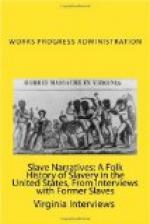Scott beat her husband a lot of times because he caught him praying. But “beatings didn’t stop my husband from praying. He just kept on praying. He’d steal off to the woods and pray, but he prayed so loud that anybody close around could hear, ’cause he had such a loud voice. I prayed too, but I always prayed to myself.” One time, Jim Scott beat her husband so unmerciful for praying that his shirt was as red from blood stain “as if you’d paint it with, a brush”. Her husband was very religious, and she claimed that it was his prayers and “a whole lot of other slaves’ that cause you young folks to be free today”.
They didn’t have any Bible on the Scott plantation she said, for it meant a beating or “a killing if you’d be caught with one”. But there were a lot of good slaves and they knew how to pray and some of the white folks loved to hear than pray too, “’cause there was no put-on about it. That’s why we folks know how to sing and pray, ’cause we have gone through so much, but the Lord is with us, the Lord’s with us, he is”.
Mrs. Richardson said that the slaves, that worked in the Master’s house, ate the same food that the master and his family ate, but those out on the plantation didn’t fare so well; they ate fat meats and parts of the hog that the folks at the “big house” didn’t eat. All the slaves had to call Scott and his wife “Master and Miss Elizabeth”, or they would get punished if they didn’t.
Whenever the slaves would leave the plantation, they ware supposed to have a permit from Scott, and if they were caught out by the “padyrollers”, they would whip them if they did not have a note from their master. When the slaves went to church, they went to a Baptist church that the Scotts belonged to and sat in the rear of the church. The sermon was never preached to the slaves. “They never preached the Lord to us,” Mrs. Richardson said, “They would just tell us to not steal, don’t steal from your master”. A week’s ration of food was given each slave, but if he ate it up before the week, he had to eat salt pork until the next rations. He couldn’t eat much of it, because it was too salty to eat any quanity of it. “We had to make our own clothes out of a cloth like you use, called canvass”. “We walked to church with our shoes on our arms to keep from wearing them out”.
They walked six miles to reach the church, and had to wade across a stream of water. The women were carried across on the men’s backs. They did all of this to hear the minister tell them “don’t steal from your Master”.
They didn’t have an overseer to whip the slaves on the Scott plantation, Scott did the whipping himself. Mrs. Richardson said he knocked her down once just before she gave birth to a daughter, all because she didn’t pick cotton as fast as he thought she should have.




